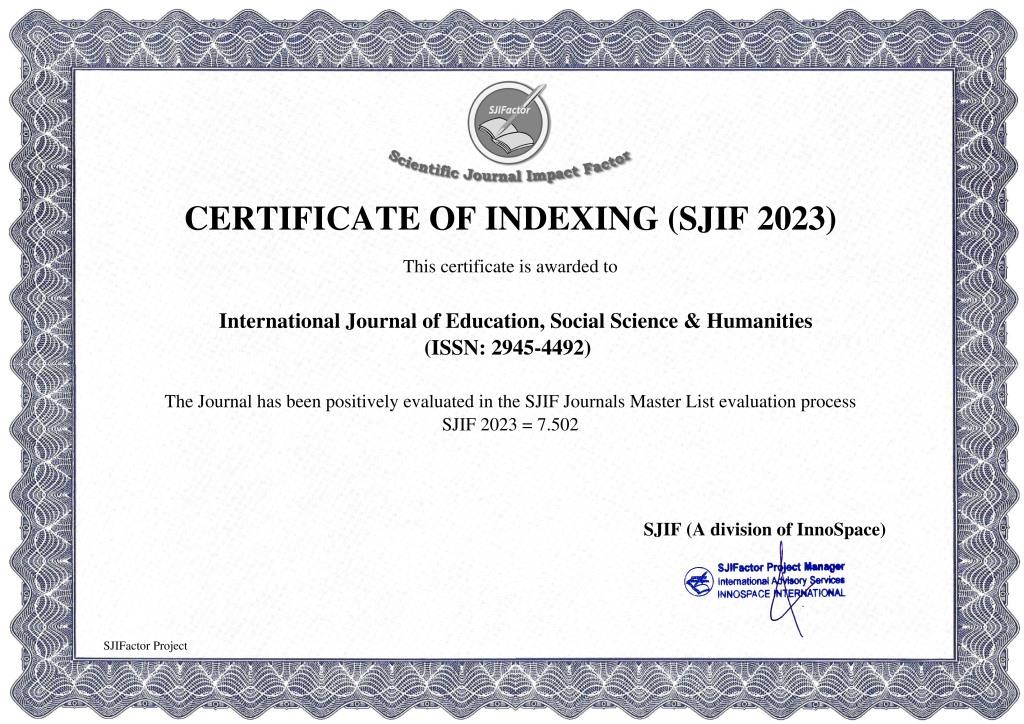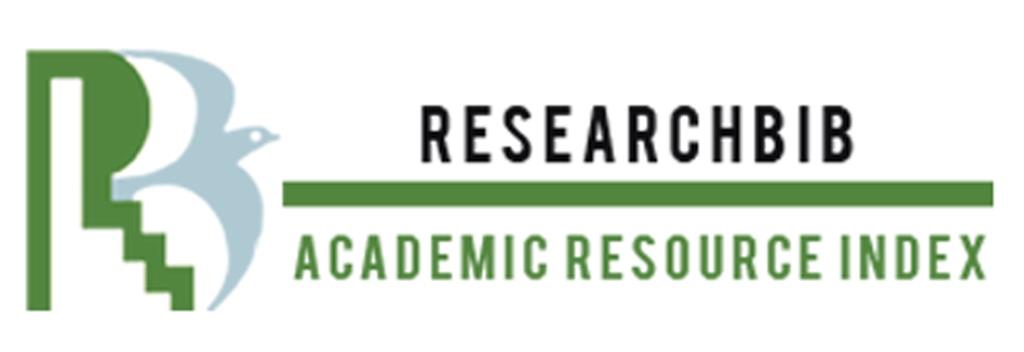METHODOLOGICAL FOUNDATIONS OF TEACHING ENGLISH IN THE HIGHER EDUCATIONAL INSTITUTIONS BASED ON THE CLUSTER APPROACH
Keywords:
teaching English, higher education, cluster approach, continued education, model, module, Natural sciences department, specialized industrial departments.Abstract
The improvements taking place in our Uzbekistan, along with the development of industrial production, are first of all reflected in the educational system. The goal of our research is to establish cooperation of the educational system institutions with production enterprises. In order to improve the quality of training of highly qualified personnel and to promote foreign cooperations, it is significant to achieve international level in foreign languages training. The research was carried out in 2020-2022, and 12 educational institutions of our Republic participated in it. The main task of our conducted research is to create a modular system based on cluster approaches in teaching English, to develop a mechanism for teaching English based on a cluster approach specifically in the field of training biology specialists at the higher educational institutions.
References
Decree No-5847 of the President of the Republic of Uzbekistan dated October 8, 2019 on "The concept of development of the higher education system of the Republic of Uzbekistan until 2030".
Abdisamatov A, Solijonov M. //Central Asian Research Journal for Interdisciplinary Studies (CARJIS). – 2022. – Т. 2. – №. 3. – С. 535-539.
Akhmedova L.T.The role and place of pedagogical technological and professional preparation of students.- Tashkent: Science and technology, 2009. - 160 p.
Anistsyna N.N.Innovative scientific and educational cluster as a way to organize innovative activities in the university // Creative Economy.2010. - No. 4 (40).- P. 91-97.
Araslanova, A.A.Quality management of higher professional education based on the formation of regional educational clusters: monograph / A.A.Araslanova.- 2nd ed., erased.- Moscow ;Berlin: Direct-Media, 2016. - 462 p.
Azizkhodjaeva N.N. Pedagogical technology and pedagogical master's degree. - Tashkent, 2002. - 145 c.
Avliyakulov N.Kh.Practical basic modular system education and pedagogical technology.Study guide – Bukhara: 2001. – 99 p
Babaniyazova N.P.Modulnaya technology obucheniya glagolov lexike angliyskogo yazyka uchashchikhsya urovnya B1 Replubike Karakalpakstan.: Autoref.dis.... candy.ped.science- T.: 2018. - 51 p.
Bergman E.M., Feser E.J. Industrial and Regional Clusters: Concepts and Comparative Applications / Regional Research Institute, WVU., – 1999. – P. 125-127.
Bezrukaya A.N.On the issue of language variability // Language as a factor in the integration of educational systems and cultures: Interuniversity.Sat.scientifictr.- Belgorod: Publishing House of BelGU, 2007. - S. 29-33.
Borodina N.V., Smailova E.S.Modular technology and professional education: Teaching method.- Ekaterinburg.: UGPPU, 2008. - 27 p.
Common European Framework of Reference for Languages: learning, teaching, assessment. – Cambridge University Press, 2001. – 261 p.
Ekimova N.V.Cluster approach in education // Education and society.- 2011. - No. 5 (70).- S. 74-77.
Galimova L.I.Educational Cluster as a Mechanism for Innovative Development of Production Activity // Bulletin of the Kazan Technical University.- 2009. - No. 5. - P. 125.
Haag D.Teoreticheskie aspekty formirovaniya konkurentosposobnosti klasterov v stranax s perehodnoy ekonomikoy.Electronic resource: www.kkrsu.edukg/vestnik/v31a15.html.Access date: 04.02.2018.
Ilyazova M.D.On the structure of the competence of a future specialist // Integration of Science and Higher Education.- 2008. - No. 1. - C. 67-70.
Kalashnikov, D. I. Formation of a cluster in the educational sector: prerequisites and prospects // FES: finance.Economy.Strategy.- 2012. - No. 1. - P. 48-51.
Krasikova T. Y. Formation and development of an educational cluster as part of the mechanism for integrating university science into an innovative national system.Electronic resource: http://www.moluch.ru/conf/econ/archive/10/782/.Access date: 02/04/2018.
Kushieva N.Kh. Khamdamov E.E. Dushaeva S. J. Technology forming the gnostic competence of teachers of foreign language. PJAEE, Palarchs Journal of archeology of Egypt/Egyptology (Scopus) 17(6) 2020 http://www.nl/index.php/jae/issue/archive
Mikhailova, M. V. Salaeva, A. L. Cluster approach to education and culture management: positive experience of Russian regions // Cluster approach to management cultural and educational space of the city.Materials of the scientific-practical conference on December 19, 2014.- Cheboksary.- pp. 74-80
Migranyan A.A.Theoretical aspects of the formation of competitive clusters in countries with economies in transition // Vestnik KRSU.- 2002. - No. 3. - S. 30.
Polat E.S.New pedagogic and information technology and educational system: Ucheb.posobie dlya stud.ped.vuzov i system povysh.qualifiedped.personnel.- M.: "Academy".2002. -272 p.
Porter M., Ketelhohn N., Artiganave A., Kelly J., Krasniqi M., Gi M. T. P., Zhang L. The Massachusetts Higher Education and Knowledge Cluster: The Microeconomics of Competitiveness. – USA: Massachusetts Press, 2010. - P. 30.
Rogova G.P. Methods of English Teaching. – Moscow: Prosvescheniye, 1975. - 310 p.
Schmitz Hubert. On the Clustering of Small Firms’, in Rasmussen, J., H. Schmitz andM.P. van Dijk (eds.). ‘Flexible specialization: a new view on small industry // IDS Bulletin (Special Issue). 1992. - № 23 (3). - P. 64-69.
Sokolova E.I.The term "educational cluster" in the conceptual field of modern pedagogy // Nepryvnoe obrazovanie: XXI vek.Vypusk 2 (6), 2014. Electronic resource: http://lll21.petrsu.ru/journal/article.php?id=2371.Access date: 04.02.2018.
Steiner M., Hartmann. Looking for the Invisible: Material and Immaterial Dimensions of Clusters, Paper presented at the Regional Studies Association Annual Conference on ‘Regionalising the Knowledge Economy’. November 21, London 2001. – P. 356-359.
Sultanov B.R., Rashidov A.S., KuzievSh.A. Military rhetoric in Uzbek and English Languages. PJAEE, Palarchs Journal of archeology of Egypt/Egyptology (Scopus) 17(6) 2020 http://www.nl/index.php/jae/issue/archive
Tigina Y.Scientific-educational cluster as an educational environment for professional-oriented foreign language training // Sovremennye problemy nauki i obrazovaniya.– 2014. – No. 6. Electronic resource: http://www.science-education.ru/ru/article/view?id=15765.Access date: 04.02.2018.
Volov V.T.Fractal-cluster theory of management of educational structures.Monograph.- Kazan: Publishing house of the Kazan state.un-ta, 2000. - 303 p.














